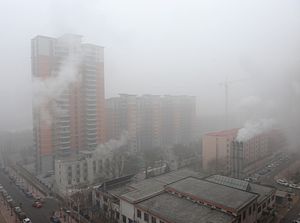Reuters, citing China’s Yanzhao Metropolis Daily, reported that a Chinese man from Hebei province has become the first person to sue the government over air pollution. Li Guixin has filed suit against the Shijiazhuang Municipal Environmental Protection Bureau seeking compensation for the heavy smog enveloping Shijiazhuang, Hebei’s capital city. “The reason that I’m proposing administrative compensation is to let every citizen see that amid this haze, we’re the real victims,” Li told the Yanzhao Metropolis Daily. Li demanded that the environmental protection bureau “perform its duty to control air pollution according to the law.”
Northern China is in the middle of another heavy smog episode, suggesting that last year’s so-called “airpocalypse” may increasingly be the new normal for late winter in the area around Beijing. The recent levels of pollution have resulted in Beijing’s first “orange” pollution alert under the capital’s new air pollution emergency response plan. Greenpeace has urged the government to adopt a “red” alert, the highest warning level, which would trigger automatic shutdown of schools and restrictions on driving. China’s World Health Organization representative called the pollution a “crisis” and recommended that Beijing residents stay home. Shijiazhuang, the site of the lawsuit, is located about 260 kilometers southwest of Beijing, well within the current smog cloud (which reportedly covered one million square kilometers).
The record-setting levels of pollution have attracted widespread attention both within and without China, increasing public pressure on the government to clean up the environment. Yet environmental litigation such as Li Guixin’s case remains a thorny issue. Last year, environmental law expert Rachel Stern of UC Berkley spoke with China Law and Policy about the role of environmental lawsuits in China. She noted that most cases, like Li Guixin’s typically involve asking for compensation for economic damages, rather than trying to seek compensation for health issues resulting from pollution. She also noted that it can be difficult for plaintiffs to convince the courts to accept their cases. China’s court system, rather than functioning independently, is under control of the Communist Party, meaning judges often refuse to take on cases that might reflect poorly on the government.
While individual cases have had some success in the past, class-action environmental lawsuits have also been limited by government fiat. Last year, the Standing Committee of China’s National People’s Congress mulled a draft amendment to China’s Environmental Protection Law that would give the “All-China Environmental Federation and its sub-branches” the exclusive right to file public interest lawsuits against polluters. The draft version would prohibit local environmental NGOs, which are typically more active in pursuing environmental protection, from filing public interest lawsuits.
After complaints and public pressure from environmental groups, the draft was revised to broaden the scope to include agencies that have been registered with the government for five years and are “in good standing.” The Chinese magazine Caijing argued that even this looser draft would prevent all but “a handful of organizations” from bringing suit. It can be extremely difficult for environmental groups to officially register with the government, and the ambiguous meaning of “good standing” would allow courts to reject lawsuits as they see fit regardless of registration status.
As an individual, Li Guixin has an easier time filing a claim, but that still doesn’t mean his case will be accepted by the courts. Li’s case is especially sensitive because it brings suit not against a polluting company, but against the government for not doing a sufficient job of policing pollution. Given the sensitivity of the issue, it’s likely that the case will be rejected by the district court. Should it be allowed to proceed, even that would be a landmark victory for environmental activists — it would set the precedent that local governments at least can be held accountable for pollution that occurs within their jurisdiction.
Alex Wang of Chinadialogue wrote in an op-ed back in 2011 that China’s resistance towards environmental litigation is based on “the fear of social instability,” the worry that allowing lawsuits on sensitive topics like pollution will threaten the government’s legitimacy. However, Wang also points out that preventing access to legal channels often simply forces people to adopt extra-judicial means of redress — such as the increased number of public protests against polluting factories. Whether through the courts or through other means, China’s citizens are increasingly determined to seek answers for the pollution that pervades their lives.

































